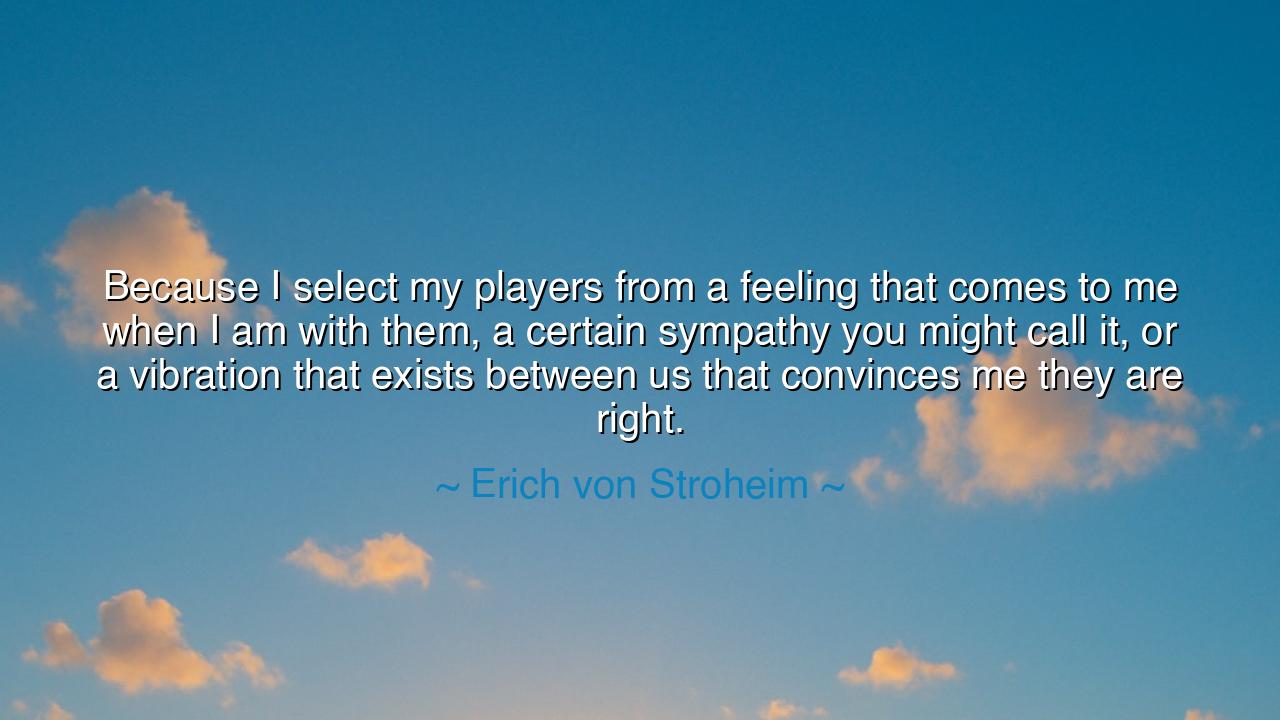
Because I select my players from a feeling that comes to me when
Because I select my players from a feeling that comes to me when I am with them, a certain sympathy you might call it, or a vibration that exists between us that convinces me they are right.






In the world of creation and leadership, there is an ancient and almost mystical understanding that true connections are not always built upon logical assessments or the measurable qualities we often rely on. Erich von Stroheim’s words, “Because I select my players from a feeling that comes to me when I am with them, a certain sympathy you might call it, or a vibration that exists between us that convinces me they are right,” capture this elusive truth. He speaks of the power of intuition and empathy, qualities that transcend the visible and the rational. This is a reminder that, often, the most important decisions—whether in choosing a companion, a partner, or a collaborator—are based on a deeper, almost spiritual resonance that is felt rather than seen.
In the ancient world, leaders and creators often relied on intuition and personal connection in their decisions. The Greek philosophers, especially Plato, spoke of the importance of inner harmony between individuals. In the Symposium, where different figures present their views on love and connection, there is a deep understanding that true connection comes from the shared vibration of souls. Plato even went so far as to suggest that love, in its highest form, was the search for a perfect connection between souls, a bond that transcended physical attraction or rationality. Socrates, too, in his dialogues, often emphasized the importance of emotional and intellectual sympathy in forming meaningful relationships, recognizing that true wisdom and understanding come from human connection as much as from logical reasoning.
Likewise, the Romans valued the relationship between leader and follower as being built on trust and shared values. The Roman generals and statesmen understood that true loyalty and success could not simply be commanded. It had to be nurtured through mutual respect, a shared vision, and, as Erich von Stroheim suggests, an almost unspoken understanding or vibration between them. Julius Caesar himself, though a brilliant strategist, was not merely a leader because of his intellect or military prowess. He was a master of building relationships, recognizing the sympathy and connection that needed to exist between him and his legions to ensure their loyalty and commitment. His charisma and ability to connect with his men were essential parts of his empire-building, much as von Stroheim’s intuition guided his choice of collaborators.
Stroheim’s approach to selecting players echoes the ancient tradition of recognizing divine or natural guidance in decision-making. Augustus, the first Roman emperor, also understood the importance of surrounding himself with individuals who shared his values and could respond to the subtle demands of leadership. He didn’t just rely on political calculation; he trusted the vibrations he felt between himself and his advisors, knowing that this unspoken bond would guide him toward the right decisions. In this sense, both Stroheim and Augustus understood that true success is not achieved solely through rational thought but through an instinctive and emotional understanding of the people around you.
What Stroheim’s words remind us is the profound importance of empathy in the creative process and leadership. To choose players, collaborators, or even allies based on sympathy or a shared emotional resonance, rather than just technical skill or logic, is a way of seeking a deeper, more harmonious connection. This emotional intelligence is not only vital for success in the arts but in all walks of life. It is through this empathy and this vibration that we come to understand the true potential of those we work with, for it is not just their outward talents we seek, but their capacity to connect with us on a deeper, almost instinctual level. In the ancient world, the most revered leaders and creators were those who could see beyond the superficial and understand the deeper essence of those around them.
The lesson from Stroheim’s words is one of intuition and empathy. When we seek to lead, create, or collaborate, it is not enough to rely on only what we can see, touch, or measure. True connection comes from a place that is felt and understood beyond words, beyond logic. It is the shared vibration between individuals that brings out the best in them, that creates harmony and fosters growth. Whether in the creative arts, leadership, or even in personal relationships, we must learn to trust our instincts, to tune in to the emotional and intuitive resonance that exists between us and others.
In our own lives, let us learn to cultivate this deeper understanding, to look beyond the surface and to seek the true connection that lies beneath. Whether we are building relationships, teams, or artistic endeavors, we must remember that the most important choices are often not the most rational ones, but those that come from an instinctual understanding of who we are aligned with, emotionally and spiritually. By listening to the subtle vibrations of those around us, we can build more meaningful and harmonious relationships, just as Erich von Stroheim did with the artists he worked with. In doing so, we open ourselves to the creative power of true human connection, one that resonates through both the intellect and the heart.






AAdministratorAdministrator
Welcome, honored guests. Please leave a comment, we will respond soon